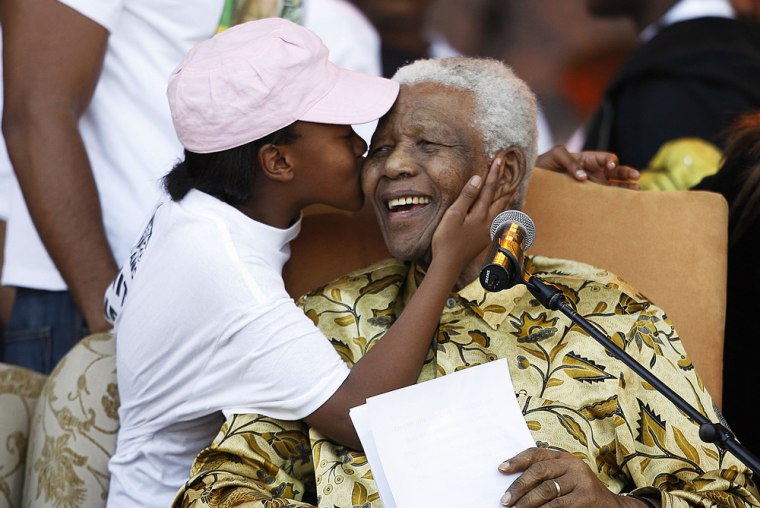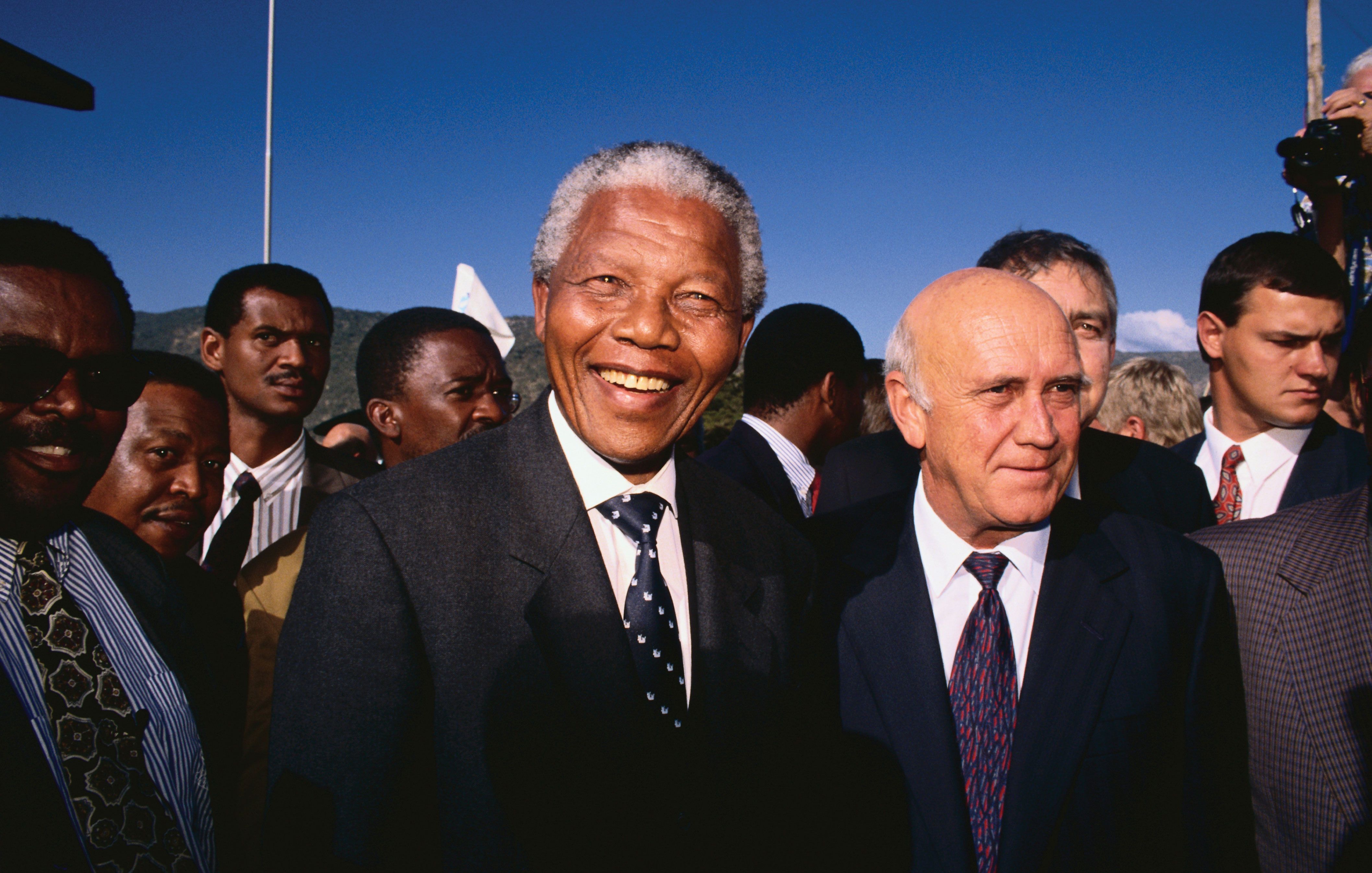Nelson Mandela: The Icon of Freedom and Reconciliation
 Nelson Mandela, often referred to by his Xhosa clan name, Madiba, stands as one of the most influential figures of the 20th century. His lifelong commitment to the struggle against apartheid in South Africa, his unwavering dedication to peace and reconciliation, and his extraordinary leadership as the country's first democratically elected president have left an indelible mark on the world. In this essay, we will explore the life, legacy, and enduring impact of Nelson Mandela, tracing his journey from activist to global symbol of freedom and reconciliation.
Nelson Mandela, often referred to by his Xhosa clan name, Madiba, stands as one of the most influential figures of the 20th century. His lifelong commitment to the struggle against apartheid in South Africa, his unwavering dedication to peace and reconciliation, and his extraordinary leadership as the country's first democratically elected president have left an indelible mark on the world. In this essay, we will explore the life, legacy, and enduring impact of Nelson Mandela, tracing his journey from activist to global symbol of freedom and reconciliation.
Early Life and Activism
Nelson Rolihlahla Mandela was born on July 18, 1918, in the village of Mvezo, in the Eastern Cape province of South Africa. Coming of age during a time of deep racial segregation and oppression, Mandela was exposed to the injustices of apartheid from an early age. Despite facing systemic discrimination and limited educational opportunities as a black South African, Mandela excelled academically and eventually attended the University of Fort Hare and later the University of Witwatersrand, where he studied law.
Mandela's political awakening came during his time as a law student, where he became involved in anti-colonial and anti-apartheid activism. He joined the African National Congress (ANC), a political organization dedicated to fighting for the rights of black South Africans, and quickly rose through the ranks, becoming increasingly involved in the struggle against apartheid. Mandela's leadership abilities and commitment to justice soon made him a prominent figure within the anti-apartheid movement, earning him both admiration and scrutiny from the South African government.
The Long Walk to Freedom In 1962, Nelson Mandela was arrested and sentenced to life imprisonment for his involvement in anti-apartheid activities. He would spend the next 27 years behind bars, enduring harsh conditions and solitary confinement on Robben Island and later in Pollsmoor Prison. Despite the physical and emotional toll of his incarceration, Mandela remained steadfast in his commitment to the struggle against apartheid, becoming a symbol of resistance and resilience for millions of oppressed South Africans.
In 1962, Nelson Mandela was arrested and sentenced to life imprisonment for his involvement in anti-apartheid activities. He would spend the next 27 years behind bars, enduring harsh conditions and solitary confinement on Robben Island and later in Pollsmoor Prison. Despite the physical and emotional toll of his incarceration, Mandela remained steadfast in his commitment to the struggle against apartheid, becoming a symbol of resistance and resilience for millions of oppressed South Africans.
During his time in prison, Mandela's stature as a global icon of freedom and justice grew, with international calls for his release echoing around the world. His imprisonment galvanized the anti-apartheid movement, sparking widespread protests, boycotts, and diplomatic pressure on the South African government to end apartheid and release Mandela and other political prisoners.
The Triumph of Reconciliation In 1990, after years of international pressure and internal reform efforts, the South African government finally released Nelson Mandela from prison, marking the beginning of a new era in the country's history. Mandela emerged from prison as a symbol of hope and reconciliation, advocating for peaceful negotiations and dialogue to bring an end to apartheid and establish a democratic, multiracial society.
In 1990, after years of international pressure and internal reform efforts, the South African government finally released Nelson Mandela from prison, marking the beginning of a new era in the country's history. Mandela emerged from prison as a symbol of hope and reconciliation, advocating for peaceful negotiations and dialogue to bring an end to apartheid and establish a democratic, multiracial society.
As president of the ANC, Mandela played a pivotal role in negotiating the transition to democracy in South Africa, leading to the historic 1994 elections that saw him elected as the country's first black president. Mandela's presidency was marked by a commitment to reconciliation and nation-building, as he sought to heal the wounds of apartheid and build a more inclusive and equitable society.
One of Mandela's most enduring legacies is his promotion of reconciliation and forgiveness as the cornerstone of South Africa's post-apartheid democracy. Rather than seeking revenge or retribution against those who had oppressed him and his people, Mandela chose the path of forgiveness and reconciliation, advocating for dialogue and understanding as a means of building a united and prosperous nation.
Legacy and Impact Nelson Mandela's legacy extends far beyond the borders of South Africa, inspiring millions of people around the world to stand up against injustice, oppression, and discrimination. His remarkable journey from prisoner to president, his unwavering commitment to peace and reconciliation, and his lifelong dedication to the cause of freedom have earned him a place among the greatest leaders of the 20th century.
Nelson Mandela's legacy extends far beyond the borders of South Africa, inspiring millions of people around the world to stand up against injustice, oppression, and discrimination. His remarkable journey from prisoner to president, his unwavering commitment to peace and reconciliation, and his lifelong dedication to the cause of freedom have earned him a place among the greatest leaders of the 20th century.
Mandela's influence continues to resonate in the ongoing struggle for human rights and social justice, serving as a beacon of hope for oppressed and marginalized communities everywhere. His message of forgiveness, tolerance, and understanding remains as relevant today as it was during the darkest days of apartheid, reminding us of the power of reconciliation to overcome even the most entrenched divisions and hatreds.
In conclusion, Nelson Mandela's life and legacy embody the triumph of the human spirit over adversity, the power of forgiveness to heal the wounds of the past, and the enduring quest for freedom and justice. As we reflect on his remarkable journey from prisoner to president, let us remember Mandela's words of wisdom and inspiration: "It always seems impossible until it's done."
Global Impact and Recognition Nelson Mandela's influence transcended borders and cultures, earning him widespread admiration and recognition on the global stage. He became a symbol of resistance against oppression and injustice, inspiring movements for freedom and equality around the world. Mandela's advocacy for peace, reconciliation, and human rights earned him numerous international awards and honors, including the Nobel Peace Prize in 1993, which he shared with South African President F.W. de Klerk, for their efforts to peacefully dismantle apartheid and establish democracy in South Africa.
Nelson Mandela's influence transcended borders and cultures, earning him widespread admiration and recognition on the global stage. He became a symbol of resistance against oppression and injustice, inspiring movements for freedom and equality around the world. Mandela's advocacy for peace, reconciliation, and human rights earned him numerous international awards and honors, including the Nobel Peace Prize in 1993, which he shared with South African President F.W. de Klerk, for their efforts to peacefully dismantle apartheid and establish democracy in South Africa.
Beyond his political achievements, Mandela's personal charisma, humility, and compassion endeared him to people from all walks of life. He was known for his warmth, kindness, and ability to connect with people from diverse backgrounds, whether they were world leaders or ordinary citizens. Mandela's ability to bridge divides and foster dialogue made him a respected elder statesman and a sought-after mediator in conflicts around the world.
Challenges and Criticisms
Furthermore, Mandela's legacy has been subject to appropriation and manipulation by political actors seeking to advance their own agendas. His image has been used to justify policies and actions that run counter to his principles of justice, equality, and human rights, leading to debates over his true legacy and intentions.
Continuing the Legacy As we reflect on Nelson Mandela's life and legacy, it is essential to recognize that his work is far from finished. The struggle for freedom, equality, and justice continues in South Africa and around the world, as new generations of activists and leaders confront the legacy of colonialism, racism, and oppression. Mandela's example reminds us of the importance of perseverance, courage, and compassion in the face of adversity, and his legacy serves as a guiding light for those who seek to build a more just and equitable world.
As we reflect on Nelson Mandela's life and legacy, it is essential to recognize that his work is far from finished. The struggle for freedom, equality, and justice continues in South Africa and around the world, as new generations of activists and leaders confront the legacy of colonialism, racism, and oppression. Mandela's example reminds us of the importance of perseverance, courage, and compassion in the face of adversity, and his legacy serves as a guiding light for those who seek to build a more just and equitable world.
In conclusion, Nelson Mandela's life was a testament to the power of hope, resilience, and reconciliation to overcome even the most formidable obstacles. His journey from prisoner to president, his commitment to peace and justice, and his unwavering belief in the inherent dignity and worth of every human being continue to inspire and motivate people around the world to work for a better future. As we honor Mandela's memory, let us also recommit ourselves to the ideals of freedom, equality, and solidarity that he so tirelessly championed.





















































